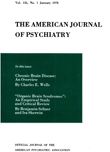Prevention of Alcohol Withdrawal Seizures: The Roles of Diphenylhydantoin and Chlordiazepoxide
Abstract
Two hundred patients with histories of chronic alcoholism and recent bouts of heavy and uncontrolled drinking were treated for alcohol withdrawal symptoms through the use of chlordiazepoxide and thiamine. One hundred of these patients, chosen at random, also received diphenylhydantoin. No withdrawal seizures occurred in either group, nor were any other differences observed. Patients with a history of previous withdrawal seizures were included in both treatment groups. These observations suggest that when adequate doses of chlordiazepoxide and thiamine are used during alcohol withdrawal, no additional anticonvulsant drug is needed to prevent seizures.
Access content
To read the fulltext, please use one of the options below to sign in or purchase access.- Personal login
- Institutional Login
- Sign in via OpenAthens
- Register for access
-
Please login/register if you wish to pair your device and check access availability.
Not a subscriber?
PsychiatryOnline subscription options offer access to the DSM-5 library, books, journals, CME, and patient resources. This all-in-one virtual library provides psychiatrists and mental health professionals with key resources for diagnosis, treatment, research, and professional development.
Need more help? PsychiatryOnline Customer Service may be reached by emailing [email protected] or by calling 800-368-5777 (in the U.S.) or 703-907-7322 (outside the U.S.).



